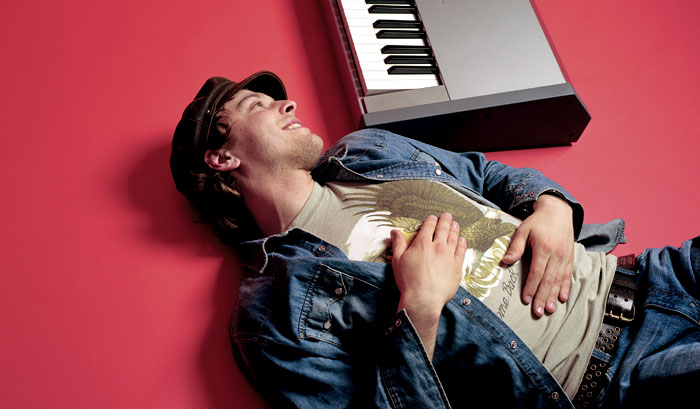


Singer-songwriter Gavin DeGraw is on the verge of releasing his debut album, Chariot, on J Records. Gavin's music is both hooky and emotive, combining urgent vocals with roots-tinged rock songwriting. We caught up with the 25-year-old New Yorker to talk about writing, recording and the nature of inspiration.
You write on both piano and guitar. Do certain emotions come through on each instrument?
No doubt about it. For me, different instruments suggest different rhythms, and those rhythms suggest melodies and voicings. I might start off writing a chorus on piano, then switch to guitar for the verse melody. It can change the whole vibe of a song.
Being in the studio definitely brings you a new awareness of what's at stake. Like thinking of a new countermelody is going to cost you ten thousand dollars.
When you finish the first draft of a song, is it done? Or do you revise a lot?
I always come back and make changes. Songs are never done. There comes a point where you say, "Let's leave it at that," but I'm always changing, and therefore the song can always change. But there should be a point where you say, "This song is what it is." It may not mean the same thing to me any longer, but I just have to let it exist, because it represents who I was at the time. Otherwise you'd never be finished.
Do the best songs come quickly?
Some songs happen in an hour, while others take years. "More Than Anyone" came together in about a day, and my publisher signed me based on that song. But if you think that's the only way to write, I definitely don't agree-it's like saying if you don't get it immediately, don't do it at all.
What do you do when you get stuck writing a song?
[Laughs.] Eat!
Is there a particular food that's good for songwriting?
Liquor? Just kidding. No, just make yourself busy, do something else. Think about someone else's song, or listen to some other music. Go hang out, spend time with your buddies.
Did the process of recording your first album teach you anything about songwriting itself?
It definitely brings a new awareness of what's at stake. Like thinking of a new countermelody in the studio is going to cost you ten thousand dollars! Unless you're some direct descendant of J.P. Morgan, you'd better have the whole thing thought out beforehand. Otherwise, you may be selling records and never making a living. You really have to have all the parts of your song worked out in advance.
And what did you learn about the process of recording?
It's a different work ethic. I'm into playing live because of the immediate response-you play, people clap. When you're recording, it's like, "Yeah, that felt really good! Okay, let's do it another 20 times, just to make sure you really got it." Just because it felt good while you were playing doesn't mean that it came off great the entire time. It's also good to take a couple days off and listen to your stuff again with fresh ears. If you're listening to your song in the studio 200 times a day, you're not going to have the most realistic perspective on how it sounds. You may have just destroyed it and not even know.
You've been using a Yamaha MOTIf8 for a while now. How's it working out for you?
It sounds great! It really sounds like a piano. We used it on the record, especially for some of the electric piano sounds, like the amped Wurly. The keyboard feels really great, and you can tweak the sounds quite a bit, which is excellent.
Have you been using it much live?
Are you kidding me? I've been destroying it! No, not really-I play hard, but it holds up great. With a piano, the way it's mic'ed, you have to play so hard to cut through, sometimes my fingers would bleed. But playing the MOTIF, it's a lot easier-I don't injure myself. It's a great board.
The record's coming out in July. Are you stoked?
Oh man, I'm so excited! And petrified. You know, it's like anxiety and bliss all wrapped together. I spent a lot of time making sure I wasn't misrepresenting myself with this record and these songs, and now we're finally turning it loose. It's an amazing feeling.
























